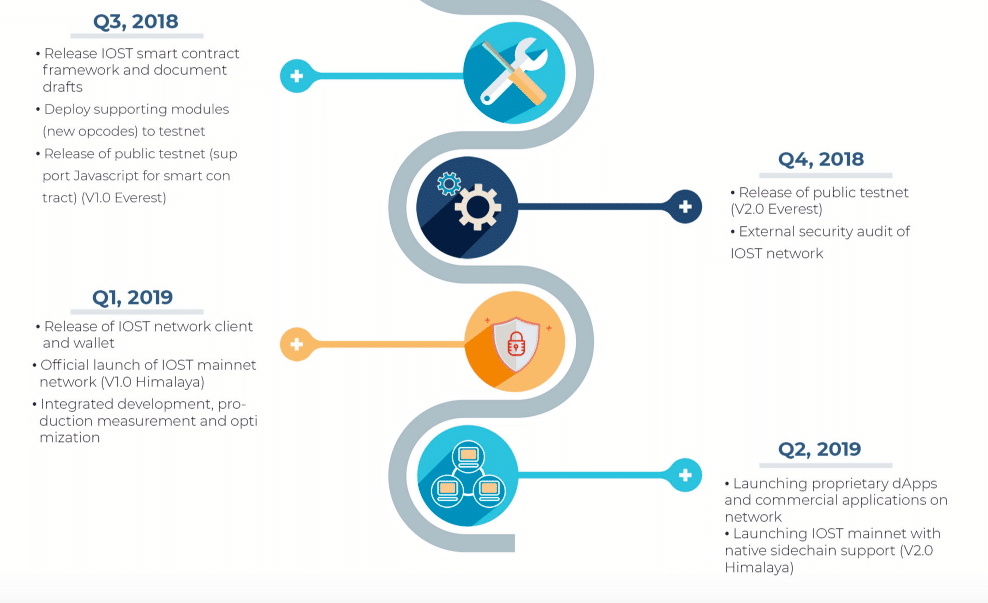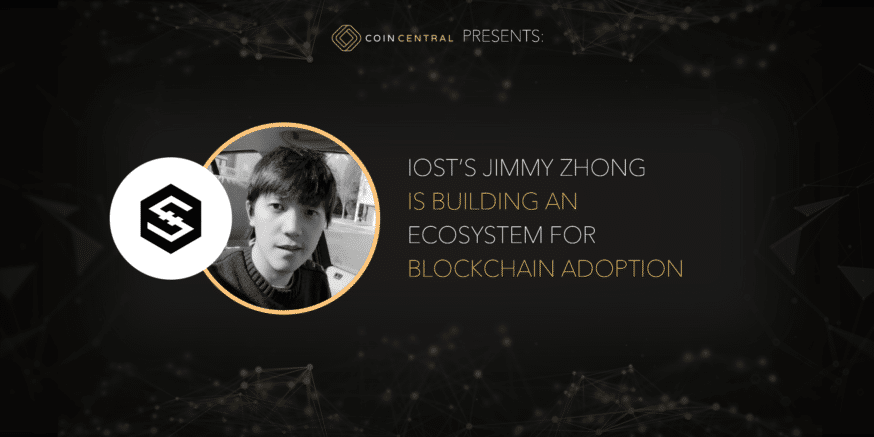- Jimmy Zhong, IOST Co-Founder and CEO
- The Scalability Trilemma
- Thoughts on Bitcoin
- Roadblocks to Adoption
- Thank You
Jimmy Zhong, IOST Co-Founder and CEO
Jimmy Zhong is no stranger to entrepreneurship. He launched his first startup, Find Inc. at 19, eventually exiting with a respectable $40 million acquisition. Since then, he’s founded two additional companies and is currently the co-founder and CEO of IOST, a blockchain infrastructure for decentralized applications (dapps). Jimmy and his team are aiming to solve the scalability problems that many dapp platforms face by implementing unique mechanisms such as Proof-of-Believability.
In a recent sit-down with CoinCentral’s Steven Buchko, Jimmy shared his views on current issues plaguing the blockchain space, Bitcoin as a payment method, and what’s in store for IOST this year.
The Scalability Trilemma
Scalability and throughput are the buzzwords in today’s blockchain landscape. Many people believe that they’re the missing piece that will finally catalyze mainstream adoption. Jimmy agrees with the sentiment but is skeptical that we need to achieve millions of transactions per second:
“We’re practical. We don’t believe the world needs a blockchain that can handle tens of millions of transactions. Even for a centralized server, you don’t need millions of transactions per second (TPS) at this point.”
But current options still aren’t good enough. Jimmy continues, “There are a lot of applications that can be built on top of a platform that can support thousands [of TPS]. But not 20 [TPS]…at that level it’s not possible to do anything.”
With greater scalability typically comes decreased decentralization, however. In what’s commonly called the scalability trilemma, it’s nearly impossible to have one without sacrificing the other. When asked how IOST approaches this, Jimmy has a two-part answer.
The first, he says, involves Proof-of-Believability (PoB), “an extra layer of reputation on top of the vanilla PoS (Proof-of-Stake) system.” He argues that a typical PoS ecosystem only serves to help the rich get richer – those who hold the largest stake gain the largest in rewards.
PoB solves this by adding another token to the IOST ecosystem, servi. Servi are “self-generating, non-tradeable, and self-destructive” tokens you earn when providing value to the IOST network.

The more servi you own, the higher your chances of creating a new block and earning IOST. Once you create a block, your servi resets to zero. Jimmy clarifies, “That’s how we tackle the centralization problem.”
To help explain the second part of IOST’s solution, Jimmy illustrates a problem he sees in Ethereum. He predicts that even with the planned move to PoS, Ethereum will still run into the same scalability issues it currently faces. In that scenario, he says, “You’re still reaching consensus among 40,000 people.” This consensus dilemma is where reputation and servi come into play again. The IOST network only needs to reach consensus among the top, say 10%, of nodes ranked by total servi. Doing so considerably cuts down the number of nodes the network needs for consensus.
This strategy contrasts significantly with EOS, another dapp platform. EOS reaches scalability by having just 21 nodes create blocks. But, these nodes are chosen by token holders. To prevent corrupt voting practices, IOST block producers are instead chosen programmatically. Jimmy emphasizes, “For us, code is everything. Your reputation is everything.”
Thoughts on Bitcoin
Interestingly, Jimmy doesn’t think the throughput issues of smart contract platforms apply to Bitcoin. He explains, “Bitcoin is not for day-to-day transactions. Gold isn’t as well…I’ve never had faith that Bitcoin is going to become day-to-day cash. I just don’t think that’s what blockchain is supposed to be used for at this point. It could be like that, but that’s not what Bitcoin is good for, and that’s not what Satoshi Nakamoto was thinking about when he was building it.”
For that reason, Bitcoin is doing fine scalability wise.
[thrive_leads id=’5219′]
Roadblocks to Adoption
Jimmy has strong opinions on the usability shortcomings of the majority of blockchain projects. “Installing Metamask alone stops 90% of people from using a product, if not more,” he argues. Beyond that, blockchain is missing that “gotta have it” app that attracts millions of users to the sector.
The IOST team wants to change that. They’ve partnered with Bluehill to create a $50 million fund dedicated to supporting dapps in the IOST ecosystem. Additionally, they’ve incubated a project called Theseus. “Theseus is only focusing on one specific thing, building dapps on top of IOST.”
Additionally, “The IOST team is] developing a data governance protocol to support content distribution based on PGC (Professionally Generated Content).” The protocol demo gained over 400,000 users within three weeks of its launch.
It’s clear that Jimmy and his team are utterly focused on adoption above all else. But, for good reason. He outlines why: “The whole reason the crypto market right now is so volatile is that there’s no real use case…There’s no real value, so you can’t blame someone for being a speculator.” He adds, “We think the real way of making people realize the value of your network isn’t the bullshit about how awesome your technology is…It depends on applications and protocols, not the network alone.”
He wraps up, “It’s not about building the most perfect technology. It’s about who actually builds something reasonable, who launches a reasonable product, and who has the ecosystem on top of it.”
We couldn’t agree more.
Thank You
Thank you, Jimmy, for taking the time out of your busy, travel-filled schedule to talk through your vision with us. We look forward to seeing the progress of IOST and the growth of the ecosystem surrounding it.
Never Miss Another Opportunity! Get hand selected news & info from our Crypto Experts so you can make educated, informed decisions that directly affect your crypto profits. Subscribe to CoinCentral free newsletter now.













